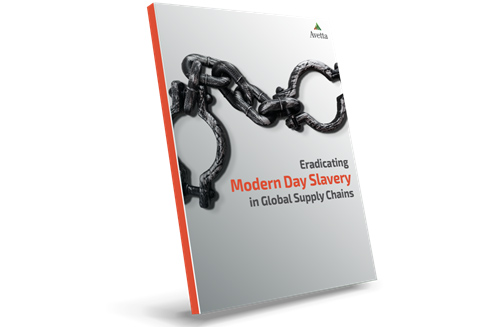While many supply chain stakeholders believe all forms of global slavery were abolished more than a hundred and fifty years ago, new research reveals that the world has more slaves today than any other time.
Avetta - a leading global supplier of supply chain risk management solutions - has just released a white paper containing these startling facts:
- The United Nations states more than 40 million people (Adults and children) are enslaved right now
- The International Labour Organization and World Economic Forum reports report 64 million girls and 88 million boys are engaged in child labor—-more than half in severely hazardous conditions
- Slavery can be found in all sectors and has many forms
Two major global sporting brands and a major soft drink company, all household names, suffered severe consequences to their brand, their bottom line and ultimately their global reputation after discovering companies within their supply chain were using child labor.
Many top fashion brands were scrutinized after a tragic fire in Bangladesh in 2013, claiming 1,134 lives of workers who were forced to work in forced conditions. Both examples caused global outcry and despite industry initiatives, the impact to their brands has not gone away.
Slavery is happening in every country and irrelevant of their place in the supply chain, businesses can be caught in the same situation because of their supplier’s labor practices. Just because a company is based in a developed economy does not mean it is immune.
For supply chain managers seeking a solution to this scourge, there's The white paper called “Eradicating Modern Day Slavery in Global Supply Chains,” which identifies the scope of the problem and offers company executives 8 steps that can be applied to mitigate the potential of slavery within their complex networks.
SC
MR


Latest Supply Chain News
- Survey reveals strategies for addressing supply chain, logistics labor shortages
- Israel, Ukraine aid package to increase pressure on aerospace and defense supply chains
- How CPG brands can deliver on supplier diversity promises
- How S&OP provides the answer to in-demand products
- AI, virtual reality is bringing experiential learning into the modern age
- More News
Latest Podcast

 Explore
Explore
Business Management News
- Survey reveals strategies for addressing supply chain, logistics labor shortages
- How CPG brands can deliver on supplier diversity promises
- How S&OP provides the answer to in-demand products
- AI, virtual reality is bringing experiential learning into the modern age
- Tips for CIOs to overcome technology talent acquisition troubles
- There is still work to do to achieve supply chain stability
- More Business Management
Latest Business Management Resources

Subscribe

Supply Chain Management Review delivers the best industry content.

Editors’ Picks





